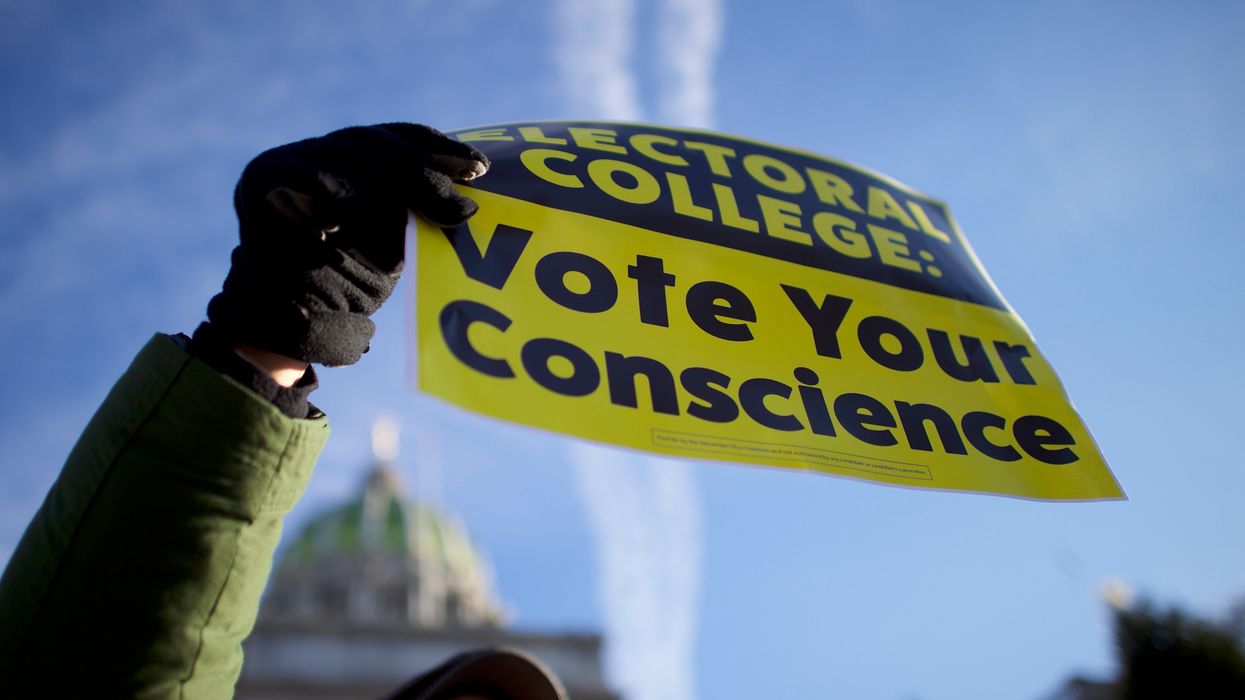The Supreme Court has disarmed one time bomb ticking away in our presidential election system — the risk of "faithless" electors throwing an election to an undeserving candidate. Other critical problems remain, which the decision can play a part in helping us address.
The court's conclusion this week that the Constitution does not "establish that electors must have discretion" should end the claim that electors play an important role in our system of checks and balances. The electors have never checked or balanced anything, and we wouldn't want them to.
Debates about the role of electors usually include conservatives citing our founding compromise between small and large states and the resulting electoral advantage for the smaller ones — which many Republicans perceive as critical protection against tyranny of the majority. But "Why electors?" is a separate question from "Why an electoral advantage for small states?"
Nothing is gained and no party benefits from keeping human electors, as compared to states' simply reporting their electoral votes. Monday's unanimous decision, supported by all five of the conservative justices, should help establish consensus on this point.
We should also be able to build consensus that most remaining problems with our presidential system stem from the winner-take-all electoral votes rules of 48 states, not the Electoral College advantage for small states.
Some facts help demonstrate why.
First, the United States is not exceptional internationally in having votes from different regions carry different weight. Every constitution addresses both citizens and territory, and in that balance many convey greater voting impact to less populated regions. In Britain, the smallest parliamentary district has one-sixth the voting population — and thus six times the impact on who becomes prime minister — as the largest.
Second, polls consistently show roughly two-thirds of Republicans oppose electing the president by national popular vote, the mechanism often proposed to end the advantage for sparsely populated states.
This is the context that makes amending the Constitution to switch to a direct popular vote effectively impossible. It also should shape our thinking about the viability of the National Popular Vote Compact, under which states agree to award their electors to the national popular vote winner once states with a combined 270 votes (a majority) sign on.
Lastly, contrary to conventional wisdom on the left, Republican nominees do not now gain a major advantage from the distribution of electoral votes.
Small-state voters certainly have more impact, but in 2016 the impact of the average red state voter was almost exactly the same as her blue state counterpart. Similarly, Donald Trump did not become president because of small states: The 16 least populous split, eight to eight. Instead, Trump won from second place because he carried states with smaller margins of victory than Hillary Clinton did.
Winner-take-all is the reason our elections effectively sideline two-thirds of the states, making voting largely meaningless in most of the country. Presidents in office respond to this odd incentive, often prioritizing swing states over the nation as a whole.
Either party can end up on the short end of margin-of-victory math. Republicans were in 1960 and could easily be again, particularly if Texas transitions to thin margins for Democrats. And, at the state level, neither party likes that both tickets ignore all but a handful of battlegrounds.
So it ought to be possible to build support for replacing winner-take-all with a new system that nonetheless maintains an advantage for small states.
Winner-take-all is nowhere in the Constitution, but became entrenched through competition among states to maximize their impact. The Founders quickly regretted this, and most advocated for amendments to prevent states' using winner-take-all.
The best known alternative is what's used by Maine and Nebraska: two electoral votes for the statewide winner and one for carrying each House district. But that injects gerrymandering into presidential elections and, applied nationwide, would still have yielded a Trump victory in 2016.
Far better for states to allocate their electoral votes proportionally to the candidates, with the proportional calculation carried to the right of the decimal point to reduce rounding.
Seventy years ago, senators voted 64-27 to amend the Constitution with exactly the features discussed here: replacing human electors with electoral votes, replacing winner-take-all with proportional allocation, and retaining the advantage for small states.
The version electoral reformers are pushing now is an improvement, because it would limit the proportional allocation to the top two vote-getters nationwide.
Here are four reasons this is a good idea:
1. The president would nearly always be the popular vote winner.
2. With shares of electoral votes available in every state, candidates would have incentive to campaign nationwide — because every state would matter.
3. The "spoiler" problem would largely be fixed. (The 1 percent in Michigan for the Green Party's Jill Stein probably swung 16 electoral votes to Trump four years ago; with top-two, her impact would have been .05 of an electoral vote.)
4. Our state results would finally reflect our true preferences, replacing the image of warring red and blue with just different shades of purple.
In the Supreme Court's decision this week, it's possible to see the justices' concern over a problem that was not even mentioned: the exceptionally high hurdles to altering the Constitution.
In less polarized and less chaotic times, maybe the court would have treated the textual questions more strictly, with the amendment path cited as an available remedy to the risk of electors permitted to be "faithless" with their votes.
If there are such doubts on the court about the prospects for amending the Constitution, we should not share them; there is no future for a country that cannot update its founding document. The outlines of a viable amendment to fix our presidential system are in plain sight. It's time to start transforming them into reality.




















Trump & Hegseth gave Mark Kelly a huge 2028 gift